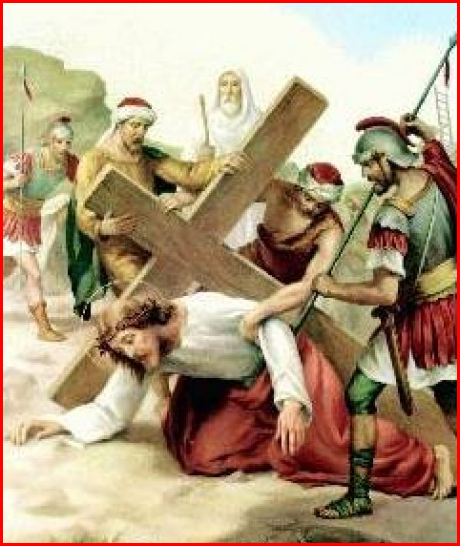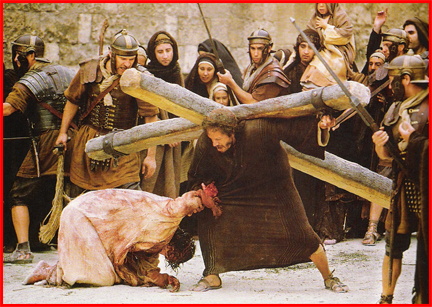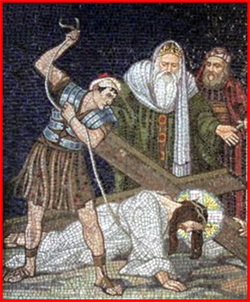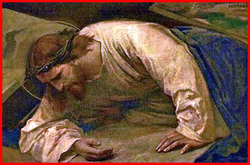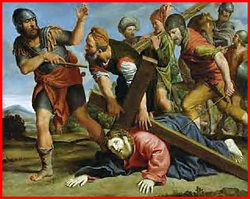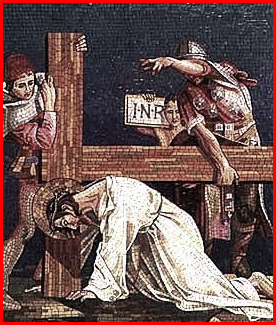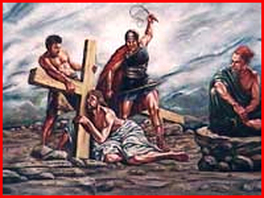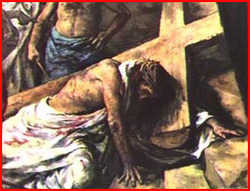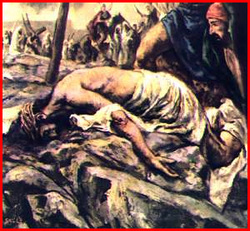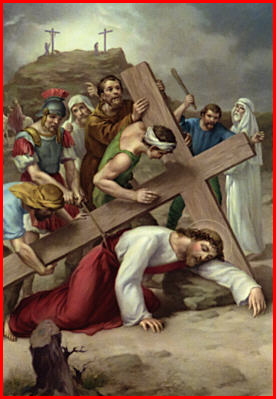| Devotion to Our Lady |
|
- Homepage
-
Daily Thoughts
- 2023 October Daily Thoughts
- Daily Thoughts Lent 2020
- Daily Thoughts for Advent 2019
- Daily Thoughts for October 2019
- Daily Thoughts for September 2019
- Daily Thoughts for August 2019
- Daily Thoughts for July
- Daily Thoughts for June
- Daily Thoughts for Easter 2019
- Daily Thoughts for Lent 2019
- Daily Thoughts for Christmas
- Daily Thoughts Easter 2022
- Sacred Heart
- Holy Ghost
-
Spiritual Life
- Holy Mass Explained
- First Friday Devotions
- First Saturday Devotions
- The Mercy of God
- Vocations
- The Path Everyone Must Walk >
- Gift of Failure
- Halloween or Hell-O-Ween?
- Ignatian Spiritual Exercises >
- Meditation is Soul-Saving
- Spiritual Communion
- Miraculous Medal
- Enrollment in Miraculous Medal
- St. Benedict Medal
- Holy Water
- Advice on Prayer
- Your Daily Mary
-
Prayers
- September Devotions
- Seven Sorrows of Our Lady
-
Novenas
>
- NV-Help of Christians
- NV-Nativity of Our Lady
- NV-Seven Sorrows
- NV- Sorrowful Heart
- NV-Pope St Pius X
- NV-La Salette
- NV-St Michael Archangel
- NV-Immaculate Heart
- NV-Assumption
- NV-Novena for Fathers
- NV-Novena for Your Mother
- NV-St Raphael Archangel
- NV-Souls in Purgatory
- NV-All Saints Day
- NV-Christ the King
- NV-Divine Motherhood
- NV-Guardian Angels
- NV-Rosary
- NV-Mirac Med
- NV- Imm Conc
- NV - Guadalupe
- NV - Nativity of Jesus
- NV-Epiphany
- NV-OL Good Success
- NV-Lourdes
- NV-St Patrick
- NV-St Joseph
- NV-Annunciation
- NV-St Louis de Montfort
- NV-OL Good Counsel
- NV-Last Supper
- NV-Passion
- NV-Pentecost
- NV-Ascension
- NV-Sacred Heart
- NV-Sacred Heart & Perpetual Help
- NV-Corpus Christi
- NV-OL of Perpetual Help
- NV-Queenship BVM
- NV-OL of Mount Carmel
- NV-St Mary Magdalen
- NV- Im Hrt
- August Devotions to IHM
- Immaculate Heart of Mary
- Litany of Dependence
- Prayers to St Mary Magdalen
- Prayers in Times of Sickness Disease & Danger
- Holy Souls in Purgatory
- Meditations on the Litany of Our Lady
- Special Feast Days
- Prayers to Mary (Mon-Sun)
- Litanies to Our Lady >
- Various & Special Needs
- Our Lady of the Rosary
- Our Lady of Mt. Carmel
- Our Lady of Perpetual Help
- Our Lady of Guadalupe
- Other titles of Our Lady
-
Rosary
- Downloads
- Consecration
- Easter Season
-
Holy Week
- Last Seven Words of Jesus >
- Characters of Passion >
- The Last Days of Christ
- Before Palm Sunday
- Palm Sunday
- Monday in Holy Week
- Tuesday in Holy Week
- Wednesday in Holy Week
- Holy Thursday (Last Supper)
- Holy Thursday (Agony & Arrest)
- Night Vigil with Christ
- Good Friday (Pilate & Herod)
- Good Friday (Way of Cross & Crucifixion)
- Saturday in Holy Week
-
Lent
- Ideas for Lent
- Daily Lenten Planner
- Daily Lenten Liturgy
- From Cold to Hot
- Lent with Aquinas
- Lent with Dom Gueranger
- Virtues for Lent
- History of Penance
- How Expensive is Sin?
- Confession of Sins
- Letter to Friends of the Cross
- Sermons for Lent
- Stations of the Cross >
- Lenten Prayers
- 7 Penitential Psalms
- Lenten Psalms SUN
- Lenten Psalms MON
- Lenten Psalms TUE
- Lenten Psalms WED
- Lenten Psalms THU
- Lenten Psalms FRI
- Lenten Psalms SAT
- Lenten Laughs
- Septuagesima
-
Christmas
- Epiphany Explained
- Suggestions for Christmas
- Food For Thought
- Christmas with Aquinas
- Christmas with Dom Gueranger
- Christmas Prayers
- Candles & Candlemas
- Christmas Sermons
- Christmas Prayers SUN
- Christmas Prayers MON
- Christmas Prayers TUE
- Christmas Prayers WED
- Christmas Prayers THU
- Christmas Prayers FRI
- Christmas Prayers SAT
- Twelve Days of Christmas >
-
Advent Journey
- Purgatory
- Christ the King
- Legion of Mary
- Scapular
-
Saints
-
Martyrs for the Faith
>
- Your Daily Martyr >
- All 365 Days of Martyrs
- Cristeros
- St Valentine & Valentine's Day
- Martyrs--Thomas Becket
- Martyrs--John the Apostle
- Holy Machabees
- Age of Martyrdom
- Carmelites of Compiegne
- Martyrs--Peter & Paul
- Martyrs--John the Baptist
- Martyrs--Andrew
- Martyrs--James the Great
- Martyrs--North American
- Martyrs--Seven Holy Sleepers
- Martyrs--Afra
- School of Martyrdom
- Martyrs--Christina
- Desert Saints >
- Saints for Sinners >
- Saints of Mary >
- History of All Saints Day
-
Martyrs for the Faith
>
- Precious Blood
- Synod 2023
-
Catechism
- Catechism Lesson 1
- Catechism Lesson 2
- Catechism Lesson 3
- Catechism Lesson 4
- Catechism Lesson 5
- Catechism Lesson 6
- Catechism Lesson 7
- Catechism Lesson 8
- Catechism Lesson 9
- Catechism Lesson 10
- Catechism Lesson 11
- Catechism Lesson 12
- Catechism Lesson 13
- Catechism Lesson 14
- Catechism Lesson 15
- Catechism Lesson 16
- Catechism Lesson 17
- Catechism Lesson 18
- Catechism Lesson 19
- Catechism Lesson 20
- Catechism Lesson 21
- Catechism Lesson 22
- Bible Study
-
Calendar
- Miracles
- Apparitions
- Shrines
- Prophecies
- Angels Homepage
- Hell
-
Church Crisis
- Conspiracy Theories
- Amazon Synod 2019 >
- Liberalism & Modernism
- Modernism--Encyclical Pascendi
- Modernism & Children
- Modernism--Documents
- The Francis Pages
- Church Enemies on Francis
- Francis Quotes
- Amoris Laetitia Critique
- Danger of Ignorance (Pius X)
- Restore all In Christ (Pius X)
- Catholic Action (Pius X)
- Another TITANIC Disaster?
- The "Errors of Russia"
- CRISIS PRAYERS
- Election Novena 2024
- The Anger Room
- War Zone
- Life of Mary
- Spiritual Gym
- Stupidity
- Coronavirus and Catholicism
- History & Facts
- Books
- Catholic Family
- Children
- Daily Quiz
-
Novena Church & Pope
- Day 01 Church-Pope Novena
- Day 02 Church-Pope Novena
- Day 03 Church-Pope Novena
- Day 04 Church-Pope Novena
- Day 05 Church-Pope Novena
- Day 06 Church-Pope Novena
- Day 07 Church-Pope Novena
- Day 08 Church-Pope Novena
- Day 09 Church-Pope Novena
- Day 10 Church-Pope Novena
- Day 11 Church-Pope Novena
- Day 12 Church-Pope Novena
- Day 13 Church-Pope Novena
- Day 14 Church-Pope Novena
- Day 15 Church-Pope Novena
- Day 16 Church-Pope Novena
- Day 17 Church-Pope Novena
- Day 18 Church-Pope Novena
- Day 19 Church-Pope Novena
- Day 20 Church-Pope Novena
- Day 21 Church-Pope Novena
- Day 22 Church-Pope Novena
- Day 23 Church-Pope Novena
- Day 24 Church-Pope Novena
- Day 25 Church-Pope Novena
- Day 26 Church-Pope Novena
- Day 27 Church-Pope Novena
- Day 28 Church-Pope Novena
- Day 29 Church-Pope Novena
- Day 30 Church-Pope Novena
- Day 31 Church-Pope Novena
- Day 32 Church-Pope Novena
- Day 33 Church-Pope Novena
- Day 34 Church-Pope Novena
- Day 35 Church-Pope Novena
- Day 36 Church-Pope Novena
- Day 37 Church-Pope Novena
- Day 38 Church-Pope Novena
- Day 39 Church-Pope Novena
- Day 40 Church-Pope Novena
- Day 41 Church-Pope Novena
- Day 42 Church-Pope Novena
- Day 43 Church-Pope Novena
- Day 44 Church-Pope Novena
- Day 45 Church-Pope Novena
- Day 46 Church-Pope Novena
- Day 47 Church-Pope Novena
- Day 48 Church-Pope Novena
- Day 49 Church-Pope Novena
- Day 50 Church-Pope Novena
- Day 51 Church-Pope Novena
- Day 52 Church-Pope Novena
- Day 53 Church-Pope Novena
- Day 54 Church-Pope Novena
- Penance Novena
- Daily WeAtheR Forecast
| 1st Station | 2nd Station | 3rd Station | 4th Station | 5th Station | 6th Station | 7th Station |
| 8th Station | 9th Station | 10th Station | 11th Station | 12th Station | 13th Station | 14th Station |
| 8th Station | 9th Station | 10th Station | 11th Station | 12th Station | 13th Station | 14th Station |
The Greatest and Most Important Time in the Church's Liturgical Year
CLICK ON ANY LINK BELOW
Also lots of LENTEN & HOLY WEEK DOWNLOADS on the downloads page (click here)
LENTEN PAGES
| ASH WEDNESDAY COUNTDOWN | LENT (MAIN PAGE) | DAILY THOUGHTS | DAILY LENTEN LITURGY | DAILY LENTEN PLANNER |
| LENTEN PRAYERS | THE 7 PENITENTIAL PSALMS | IDEAS FOR PENANCE | LENT WITH AQUINAS | LENT WITH DOM GUERANGER |
| HISTORY OF PENANCE | PENANCES OF THE SAINTS | HOW EXPENSIVE IS SIN? | CONFESSION OF SINS | ARE FEW SOULS SAVED? |
| VIRTUES FOR LENT | FROM COLD TO HOT | LENTEN LAUGHS | | SERMONS FOR LENT | LETTER TO FRIENDS OF THE CROSS |
| STATIONS OF THE CROSS (INDIVIDUALLY) | ALL 14 STATIONS OF THE CROSS | LITANIES FOR PASSIONTIDE |
| THE LAST DAYS OF CHRIST | SPECIAL HOLY WEEK PAGES |
LITURGICAL PRAYERS FOR EACH DAY OF THE WEEK DURING LENT
| Sundays of Lent | Mondays of Lent | Tuesdays of Lent | Wednesdays of Lent | Thursdays of Lent | Fridays of Lent | Saturdays of Lent |
HOLY WEEK PAGES
| Holy Week Main Page | Before Palm Sunday | Palm Sunday | The Last Days of Christ | Holy Thursday Last Supper Novena | Good Friday Passion Novena |
| Monday of Holy Week | Tuesday of Holy Week | Wednesday of Holy Week | Holy Thursday (Last Supper) | Holy Thursday (Agony & Arrest) |
| Night Vigil With Christ | Good Friday (Pilate & Herod) | Good Friday (Way of Cross & Crucifixion) | Holy Saturday |
THE CHIEF CHARACTERS OF THE PASSION
| Characters of the Passion Mainpage | The Sanhedrin | Pharisees | Scribes | Saducees | Jewish Crowd | Roman Rulers |
| Judas | Annas & Caiphas | Pontius Pilate | Herod | Barabbas | Dismas the Good Thief | St. Peter | St. John | Mary Magdalen |
THE FOURTEEN STATIONS OF THE CROSS
| Introduction to the Stations of the Cross | Short Version of the Stations of the Cross (all 14 on one page) | 1st Station | 2nd Station | 3rd Station |
| 4th Station | 5th Station | 6th Station | 7th Station | 8th Station | 9th Station | 10th Station | 11th Station | 12th Station | 13th Station | 14th Station |
THE LAST SEVEN WORDS OF JESUS FROM THE CROSS
| Seven Last Words on the Cross (Introduction) | The 1st Word on the Cross | The 2nd Word on the Cross | The 3rd Word on the Cross |
| The 4th Word on the Cross | The 5th Word on the Cross | The 6th Word on the Cross | The 7th Word on the Cross |
PRAYERS AND DEVOTIONS TO THE SEVEN SORROWS OF OUR LADY
| Seven Sorrows Meditations | Short Prayers & Short Seven Sorrows Rosary | Longer Seven Sorrows Rosary |
| 1st Sorrow of Our Lady | 2nd Sorrow of Our Lady | 3rd Sorrow of Our Lady | 4th Sorrow of Our Lady |
| 5th Sorrow of Our Lady | 6th Sorrow of Our Lady | 7th Sorrow of Our Lady |
| Novena #1 to the Sorrowful Heart of Mary | Novena #2 to the Sorrowful Heart of Mary |
CLICK ON ANY LINK BELOW
Also lots of LENTEN & HOLY WEEK DOWNLOADS on the downloads page (click here)
LENTEN PAGES
| ASH WEDNESDAY COUNTDOWN | LENT (MAIN PAGE) | DAILY THOUGHTS | DAILY LENTEN LITURGY | DAILY LENTEN PLANNER |
| LENTEN PRAYERS | THE 7 PENITENTIAL PSALMS | IDEAS FOR PENANCE | LENT WITH AQUINAS | LENT WITH DOM GUERANGER |
| HISTORY OF PENANCE | PENANCES OF THE SAINTS | HOW EXPENSIVE IS SIN? | CONFESSION OF SINS | ARE FEW SOULS SAVED? |
| VIRTUES FOR LENT | FROM COLD TO HOT | LENTEN LAUGHS | | SERMONS FOR LENT | LETTER TO FRIENDS OF THE CROSS |
| STATIONS OF THE CROSS (INDIVIDUALLY) | ALL 14 STATIONS OF THE CROSS | LITANIES FOR PASSIONTIDE |
| THE LAST DAYS OF CHRIST | SPECIAL HOLY WEEK PAGES |
LITURGICAL PRAYERS FOR EACH DAY OF THE WEEK DURING LENT
| Sundays of Lent | Mondays of Lent | Tuesdays of Lent | Wednesdays of Lent | Thursdays of Lent | Fridays of Lent | Saturdays of Lent |
HOLY WEEK PAGES
| Holy Week Main Page | Before Palm Sunday | Palm Sunday | The Last Days of Christ | Holy Thursday Last Supper Novena | Good Friday Passion Novena |
| Monday of Holy Week | Tuesday of Holy Week | Wednesday of Holy Week | Holy Thursday (Last Supper) | Holy Thursday (Agony & Arrest) |
| Night Vigil With Christ | Good Friday (Pilate & Herod) | Good Friday (Way of Cross & Crucifixion) | Holy Saturday |
THE CHIEF CHARACTERS OF THE PASSION
| Characters of the Passion Mainpage | The Sanhedrin | Pharisees | Scribes | Saducees | Jewish Crowd | Roman Rulers |
| Judas | Annas & Caiphas | Pontius Pilate | Herod | Barabbas | Dismas the Good Thief | St. Peter | St. John | Mary Magdalen |
THE FOURTEEN STATIONS OF THE CROSS
| Introduction to the Stations of the Cross | Short Version of the Stations of the Cross (all 14 on one page) | 1st Station | 2nd Station | 3rd Station |
| 4th Station | 5th Station | 6th Station | 7th Station | 8th Station | 9th Station | 10th Station | 11th Station | 12th Station | 13th Station | 14th Station |
THE LAST SEVEN WORDS OF JESUS FROM THE CROSS
| Seven Last Words on the Cross (Introduction) | The 1st Word on the Cross | The 2nd Word on the Cross | The 3rd Word on the Cross |
| The 4th Word on the Cross | The 5th Word on the Cross | The 6th Word on the Cross | The 7th Word on the Cross |
PRAYERS AND DEVOTIONS TO THE SEVEN SORROWS OF OUR LADY
| Seven Sorrows Meditations | Short Prayers & Short Seven Sorrows Rosary | Longer Seven Sorrows Rosary |
| 1st Sorrow of Our Lady | 2nd Sorrow of Our Lady | 3rd Sorrow of Our Lady | 4th Sorrow of Our Lady |
| 5th Sorrow of Our Lady | 6th Sorrow of Our Lady | 7th Sorrow of Our Lady |
| Novena #1 to the Sorrowful Heart of Mary | Novena #2 to the Sorrowful Heart of Mary |
THE NINTH STATION : JESUS FALLS THE THIRD TIME
“St. Augustine assures us that there is no spiritual exercise more fruitful or more useful than the frequent reflection on the sufferings of Our Lord. St. Albert the Great, who had St. Thomas Aquinas as his student, learned in a revelation that by simply thinking of or meditating on the Passion of Jesus Christ, a Christian gains more merit than if he had fasted on bread and water every Friday for a year, or had beaten himself with the discipline once a week till blood flowed, or had recited the whole Book of Psalms every day” (The Secret of the Rosary, St. Louis Marie de Montfort, “Twenty-Eighth Rose”).
|
The following passage is taken from The Dolorous Passion of Our Lord Jesus Christ by Blessed Anne Catherine Emmerich
The procession was still at some distance from the south-west gate, which was large, and attached to the fortifications, and the street was rough and steep; it had first to pass under a vaulted arch, then over a bridge, and finally under a second arch. The wall on the left side of the gate runs first in a southerly direction, then deviates a little to the west, and finally runs to the south behind Mount Sion. When the procession was near this gate, the brutal archers shoved Jesus into a stagnant pool, which was close to it; Simon of Cyrene, in his endeavors to avoid the pool, gave the cross a twist, which caused Jesus to fall down for the fourth time in the midst of the dirty mud, and Simon had the greatest difficulty in lifting up the cross again. Jesus then exclaimed in a tone which, although clear, was moving and sad: "Jerusalem, Jerusalem, how often would I have gathered together thy children as the hen doth gather her chickens under her wings, and thou wouldst not?" When the Pharisees heard these words, they became still more angry, and recommencing their insults and blows endeavored to force him to get up out of the mud. Their cruelty to Jesus so exasperated Simon of Cyrene that he at last exclaimed,"If you continue this brutal conduct, I will throw down the cross and carry it no further. I will do so if you kill me for it." Jesus was on the point of again falling, but Simon, who was behind, perceiving that he could not stand, hastened to support him; he leant upon Simon, and was thus saved from falling to the ground. The procession again moved on; the road was very steep and rough between the walls of the town and Calvary, and Jesus had the greatest difficulty in walking with his heavy burden on his shoulders; but his cruel enemies, far from feeling the slightest compassion, or giving the least assistance, continued to urge him on by the infliction of hard blows, and the utterance of dreadful curses. At last they reached a spot where the pathway turned suddenly to the south; here he stumbled and fell for the sixth time. The fall was a dreadful one, but the guards only struck him harder to force him to get up, and no sooner did he reach Calvary than he sank down again. Simon of Cyrene was filled with indignation and pity; notwithstanding his fatigue, he wished to remain that he might assist Jesus, but the archers first reviled, and then drove him away, and he soon after joined the body of disciples. The executioners then ordered the workmen and the boys who had carried the instruments for the execution to depart, and the Pharisees soon arrived, for they were on horseback, and had taken the smooth and easy road which ran to the east of Calvary. The following passage is taken from The Mystical City of God by the Venerable Mary of Agreda WORDS OF OUR LADY My daughter, know that a fall from the highest position is extremely dangerous and the damage done is either irreparable, or very difficult of redress. Lucifer held an eminent position in Heaven, as regards both natural gifts and gifts of grace; for in beauty he excelled all the creatures, and by his sin he fell to the deepest abyss of loathsomeness and misery and into a more hardened obstinacy than all his followers. The first parents of the human race, Adam and Eve, were exalted to the highest dignity and raised to exquisite favor, as coming forth from the hand of the Almighty: their fall caused perdition to themselves and to all their posterity, and faith teaches what was the cost of their salvation. To restore them and their posterity was the work of an infinite mercy. Many other souls have reached the heights of perfection and have thence fallen most unfortunately, arriving at a state in which they almost despaired or found themselves incapable of rising. This sad state in the creature originates from many causes. The first is the dismay and boundless confusion of one who feels that he has fallen from an exalted state of virtue; for he knows that he has not only lost great blessings, but he does not expect to obtain greater ones than those of the past and those he has lost; nor does he promise himself more firmness in keeping those he can obtain through renewed efforts, than he has shown in those acquired and now lost through his ingratitude. From this dangerous distrust originates lukewarmness, want of fervor and diligence, absence of zeal and devotion; since diffidence extinguishes all these in the soul, just as the sprightliness of ardent hope overcomes many difficulties, strengthens and vivifies weak human creatures to undertake great works. Another obstacle there is, not less formidable, namely: the spiritually minded souls, accustomed to the blessings of God, usually aggravate their sins by a certain contempt of these very blessings and a certain abuse of the divine things. For by the abundance of the divine favors they fall into a dangerous dullness of mind. They begin to think little of the divine favors and become irreverent. Thus failing to cooperate with God's grace, they hinder its effect. They lose the grace of holy fear of the Lord, which arouses and stimulates the will to obey the divine commandments and to be alert in the avoidance of sin and pursuit of eternal life in the friendship of God. This is an evident danger for lukewarm priests, who frequent the Holy Eucharist and other Sacraments, without fear and reverence; also for the learned and wise, and the powerful of this world, who so reluctantly correct and amend their lives. They have lost the appreciation and veneration of the remedial helps of the Church, namely, the Sacraments, preaching and instruction. Thus these medicines, which for other sinners are so salutary and counteract ignorance, weaken those who are the physicians of the spiritual life. There are other reasons for this kind of danger, which must be referred to the Lord Himself. For the sins of those souls who, by their state or by their advanced virtues, are more closely bound to their God, are weighed in the balance of God's justice in quite a different way from the sins of those who have been less favored by His mercy. Although the sins of all are more or less essentially the same, yet the circumstances of sin are very different. For the priests and teachers, the powerful and the dignitaries, and those who, on account of their station or by reputation, are supposed to be advanced in a holy life, cause great scandal by their fall or by any sins they commit. There is much more of bold disrespect in their presumption and temerity against God, Whom they know better and to Whom they owe much more, but Whom they offend with more deliberation and knowledge than the ignorant. Hence, as is evident from the tone of all the Holy Scriptures, the sins of Catholics, and especially of those that are instructed and enlightened, are so displeasing to God. As the term of each man's life is preordained for each one, as the time in which he is to gain the eternal reward, so the measure, or number of sins to be borne by the patience or forbearance of the Lord, is likewise preordained. This measure of divine justice is determined not only by the number and quantity of the sins, but also by their quality and weight. Thus it may happen, that in the souls favored by greater enlightenment and graces of Heaven, the grievousness supplies what is wanting in the number of the sins, and that, with fewer sins, they are forsaken sooner and chastised more severely than others, who are guilty of many more sins. Many there are who wish to follow Christ and very few who truly dispose themselves to imitate Him; for as soon as they feel the sufferings of the Cross they cast it aside. Laborious exertions are very painful and averse to human nature according to the flesh; and the fruits of the spirit are more hidden and few guide themselves by the light. On this account there are so many among mortals, who, forgetful of the eternal truths, seek the flesh and the continual indulgence of its pleasures. They ardently seek honors and fly from injuries: they strive after riches, and contemn poverty; they long after pleasure and dread mortification. All these are enemies of the Cross of Christ (Philippians 3:18), and with dreadful aversion they fly from it, deeming it sheer ignominy, just like those who crucified Christ, the Lord. Another deceit has spread through the world: many imagine that they are following Christ their Master, though they neither suffer affliction nor engage in any exertion or labor. They are content with avoiding boldness in committing sins, and place all their perfection in a certain prudence or hollow self-love, which prevents them from denying anything to their will and from practicing any virtues at the cost of their flesh. They would easily escape this deception, if they would consider that my Son was not only the Redeemer, but their Teacher; and that He left in this world the treasures of his Redemption not only as a remedy against its eternal ruin, but as a necessary medicine for the sickness of sin in human nature. No one knew so much as my Son and Lord; no one could better understand the quality of love than the divine Lord, Who was and is wisdom and charity itself; and no one was more able to fulfill all His wishes (1 John 4:16). Nevertheless, although He well could do it, He chose not a life of softness and ease for the flesh, but one full of labors and pains; for He judged his instructions to be incomplete and insufficient to redeem man, if He failed to teach them how to overcome the demon, the flesh and their own self. He wished to inculcate, that this magnificent victory is gained by the Cross, by labors, penances, mortifications and the acceptance of contempt: all of which are the trademarks and evidences of true love and the special watchwords of the predestined. MEDITATION The procession, starting from Pilate's mansion, moved in a westerly direction over twelve hundred paces through the middle of the city. The most frequented streets were carefully chosen for the march. "Whenever we crucify a criminal," writes Quintilian, "the most populous streets are selected so that the multiude may look on and be seized with fear." What the Redeemer suffered on this way of the cross goes beyond all we can conceive. At every step on the uneven, hilly street, the wounds of His scourged shoulder become deeper and more yawning. Often the heavy cross-beam fell against the thorn-crowned Head. The Saviour, tired unto death and without strength, drags Himself wearily along under the mighty load. Suddenly the procession halts. What has happened? The Almighty, the infinitely Powerful has sunk exhausted, and upon Him has fallen the wood of martyrdom. He writhes in pain in the dust like to a worm trodden upon. But the soldiers know a remedy. With scourges and sharp thorns applied according to Roman usage, they help Him to His feet, and again Christ staggers along. But behold, after a few hundred steps, He falls a second time and, near the gate of the city, a third time.' Our relapses into sin are the cause of this. If the sufferings of His body were great, the sufferings of His Divine Heart were still greater. I shall not speak of the scorn of His avowed enemies, who gave vent to their satanic joy by blaspheming Him and spitting upon Him, by blows and kicks, and by throwing dirt and stones upon Him. It caused Christ more sadness that the official sentence of death had not failed to make an impression upon those who, during the trial, had been partly in sympathy with Him. "He must then," they said one to another, "have been an impostor, a magician, a blasphemer and a rebel, or matters would not have taken such a bad turn." CONCLUDING PRAYER V. We adore Thee, O Christ, and we praise Thee, R.. Because by Thy holy cross Thou hast redeemed the world. PRAYER O Jesus, Son of David, have mercy on me! Offer me Thy helping hand, and aid me, that I may not fall again into my former sins. From this very moment, I will earnestly strive to reform: nevermore will I sin! Thou, O sole support of the weak, by Thy grace, without which I can do nothing, strengthen me to carry out faithfully this my resolution. Our Father Hail Mary. Glory Be. V. Lord Jesus, crucified, R. Have mercy on us! |
Web Hosting by Just Host

